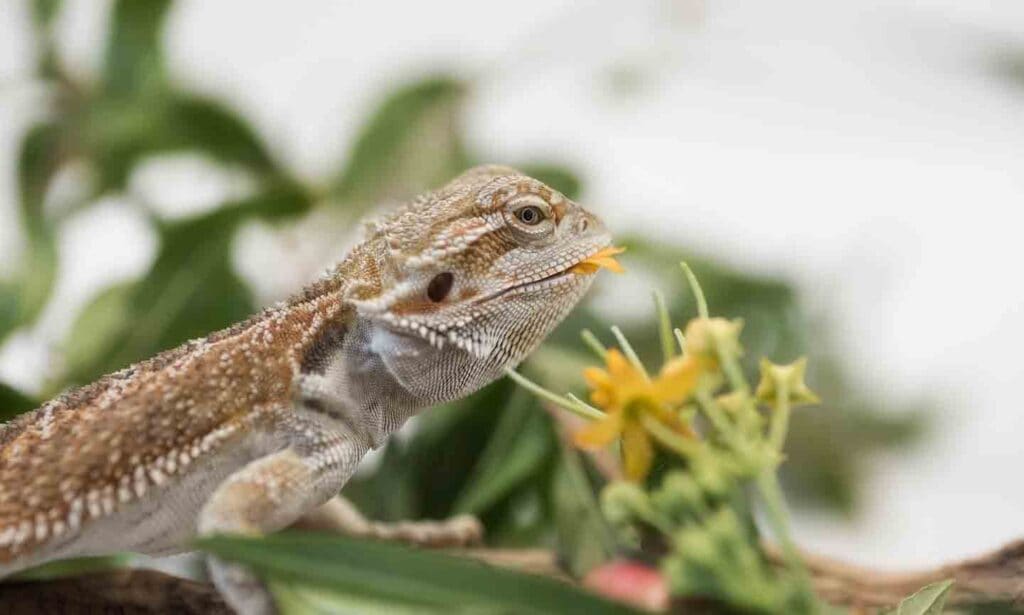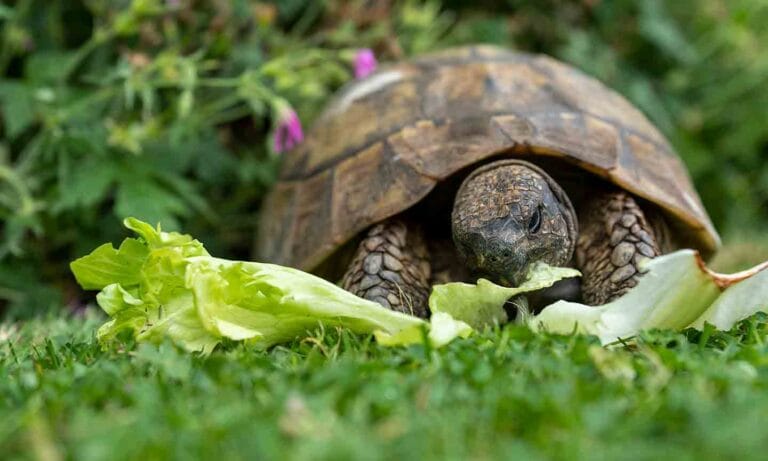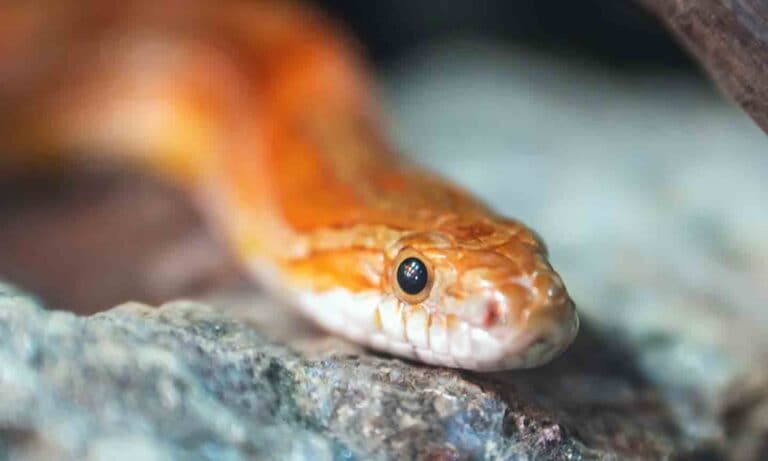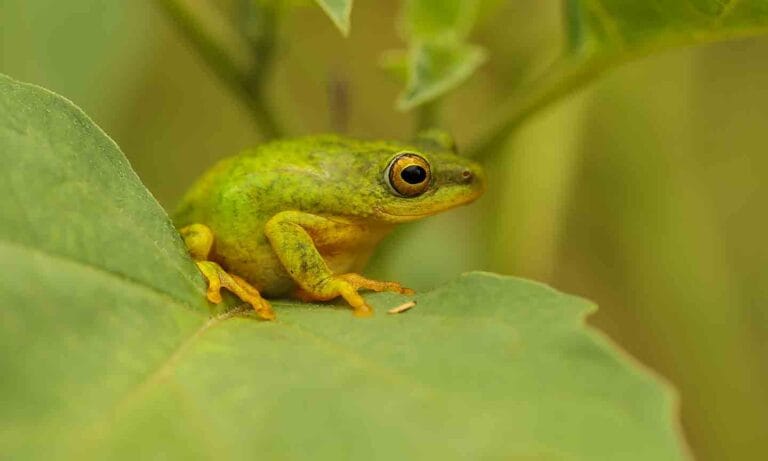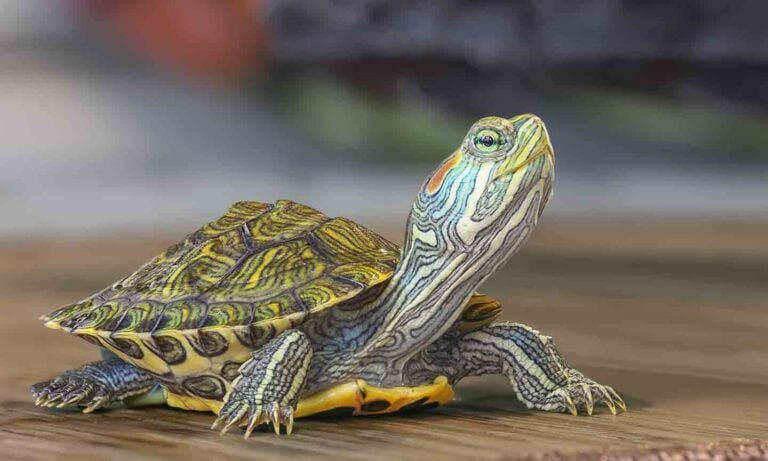In This Guide
What Do Bearded Dragons Eat?
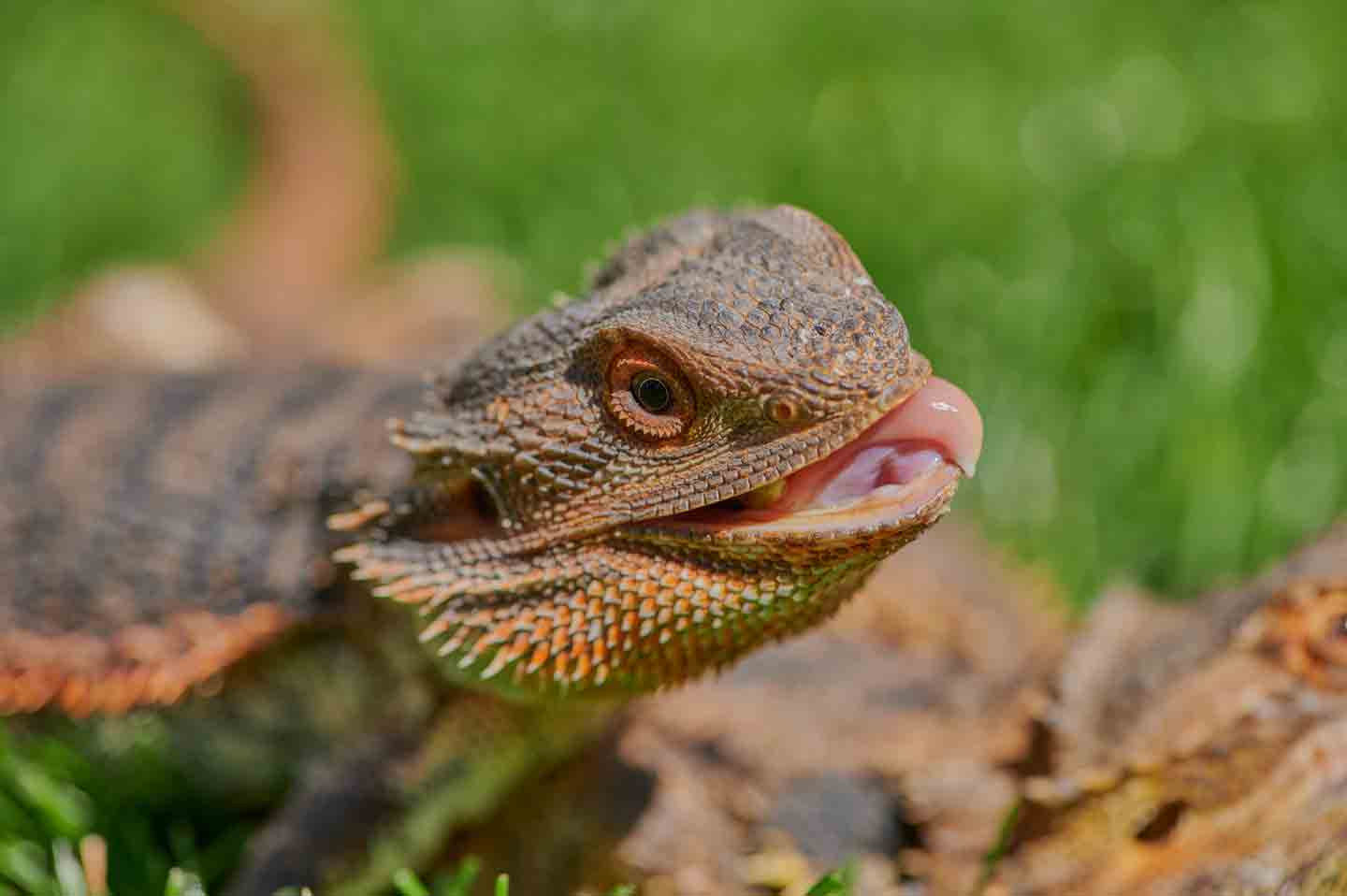
Bearded dragons are omnivores, meaning they eat a combination of plants and “meats”—though, in this case, the meats we’re talking about are chewy, delicious insects.
“For bearded dragons, they need both vegetables and a variety of insects fed to them to get proper nutrition,” explains Dana Varble, DVM, CAE, chief veterinary officer for the North American Veterinary Community (NAVC), in Fox Lake, Illinois. “When they are young, an ideal bearded dragon diet tends to be more insects with some veggies. Then, once they reach adulthood, their diet shifts to contain more vegetables.”
Regardless of their life stage, though, all pet bearded dragons eat both plants and meat to meet their nutrition needs.
What Vegetables Can Bearded Dragons Eat?
Bearded dragons should be offered a small salad of vegetables every day.
“The salad should be about 80% to 90% dark leafy greens, and the best greens are those with good fiber and calcium content,” Dr. Varble says. Some good options include:
- Dandelion greens
- Collard greens
- Mustard greens
- Bok choy
- Turnip greens
- Watercress
- Romaine lettuce
Don’t give your pet iceberg or leaf lettuce—they don’t contain enough nutrients and may cause metabolic disease.
Along with leafy greens, you can feed pet bearded dragons the following veggies:
- Bell peppers
- Butternut squash
- Zucchini
- Okra
- Sweet potato (in moderation)
- Endive
- Carrots
- Green beans
- Cucumbers
Make sure these items are fresh, then grate or chop into small pieces to reduce the risk of choking, gastrointestinal blockage, and constipation.
What Fruits Can Bearded Dragons Eat?
Veggies are one of a bearded dragon’s favorite things to eat, but these guys also enjoy some sweet and juicy fruits. Dr. Varble says that fruits should be offered in a smaller portion compared to veggies, accounting for no more than 5% of their diet. This is because they’re higher in sugar, which beardies should eat only in moderation.
Here are some of Dr. Varble’s favorite fruits to feed a pet bearded dragon:
- Strawberries
- Raspberries
- Blueberries
- Watermelon
- Melon
- Bananas
- Pears
- Apples
- Blackberries
- Peaches
- Mango
- Papaya
Again, make sure these foods are fresh and chopped into small pieces and fed only in moderation.
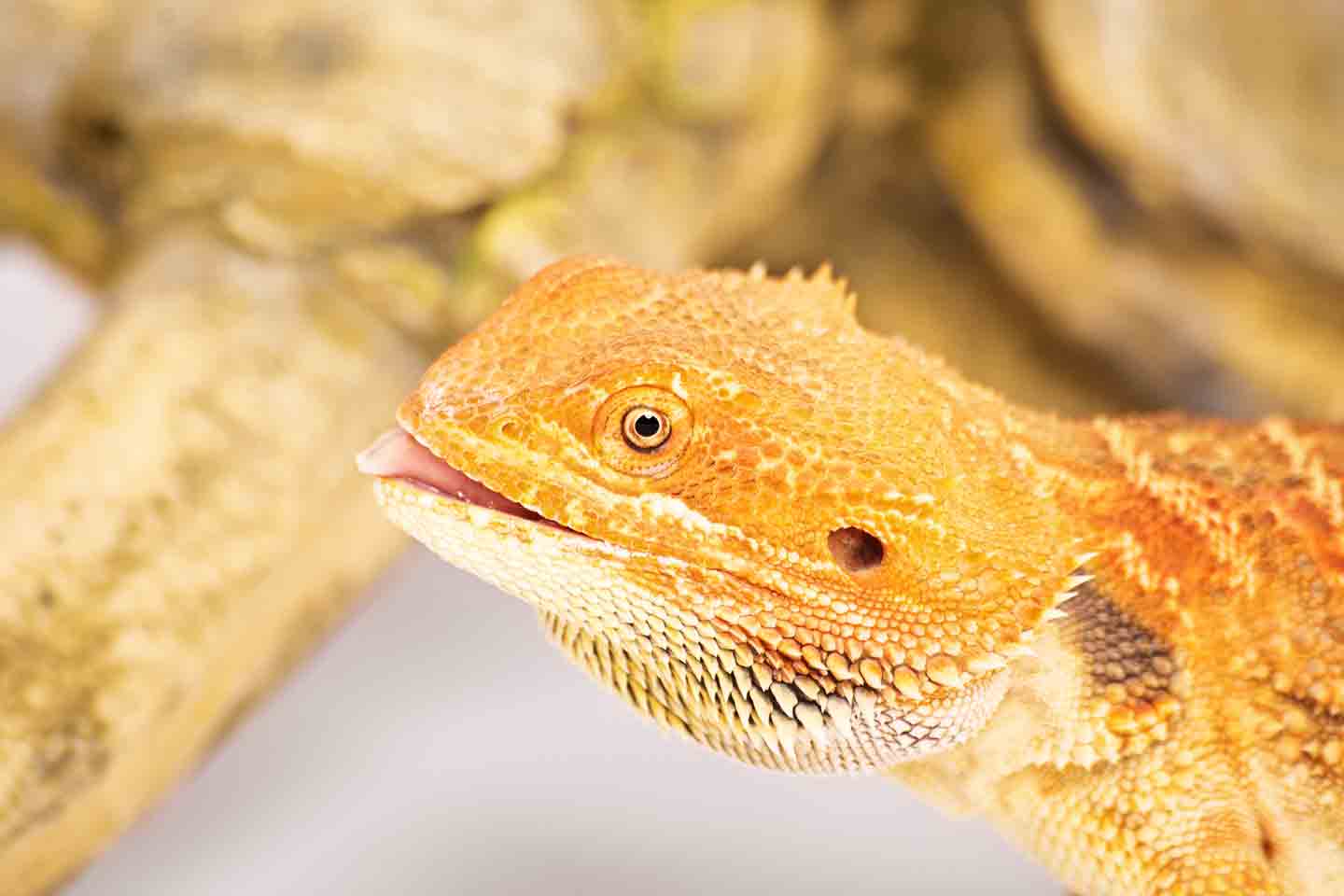
What Live Food Can Bearded Dragons Eat?
As we mentioned above, bearded dragons eat an omnivore diet. That means your pet reptile also needs to get some protein via live insects.
“When they are young, they should be offered insects each day, and then two to three times a week as adults,” Dr. Varble says. “They should only be offered as many insects as they can eat in 15 to 20 minutes and should not be left unattended with insects.” These steps help ensure that your lizard isn’t overeating, that they eat safely, and that you can quickly notice any changes in eating habits that might indicate a health issue.
Insects that are good foods for bearded dragons include:
- Crickets
- Dubia roaches
- Silkworms
- Mealworms
- Black soldier fly larvae
- Earthworms
- Hornworms (as treats only, due to high fat content)
- Waxworms (as treats only, due to high fat content)
Calcium Supplementation
Pet bearded dragons need calcium supplements to thrive, so pet parents must provide those supplements to fulfill this dietary need.
“All insects have high phosphorus compared to calcium and need to be gut loaded [for calcium]”—meaning fed a special diet that increases their calcium content—prior to being fed to your beardie, Dr. Varble explains. Without this extra calcium, bearded dragons have a higher risk of developing nutritional secondary hyperparathyroidism, a type of metabolic bone disease.
Don’t worry—you don’t have to gut load your beardie’s insects yourself. There are plenty of gut-loaded lizard diets available for purchase, like Fluker’s Freeze-Dried Crickets.
You can also provide them calcium through vitamin supplementation.
“Hatchling bearded dragons—less than 3 months of age—require daily calcium supplementation, while adults need calcium two to three times a week,” advises Dr. Varble. “This calcium powder can be dusted on the surface of their insects and/or sprinkled on the surface of their vegetable salad.”
Beardies also need a vitamin D3 supplement, which you can feed the same way.
Multivitamins
Because it’s challenging to create a fully balanced bearded dragon diet, it is a good idea to provide your pet with a multivitamin supplement as well. Dr. Varble advises to look for a reptile supplement specifically formulated for bearded dragons or other omnivorous reptiles. “It should be offered two to three times a week for hatchlings and once a week for adults.”
She adds that it’s best to offer the multivitamin separately from the calcium supplement, as offering both at once may decrease the absorption of nutrients.
Bearded Dragon Feeding Tips
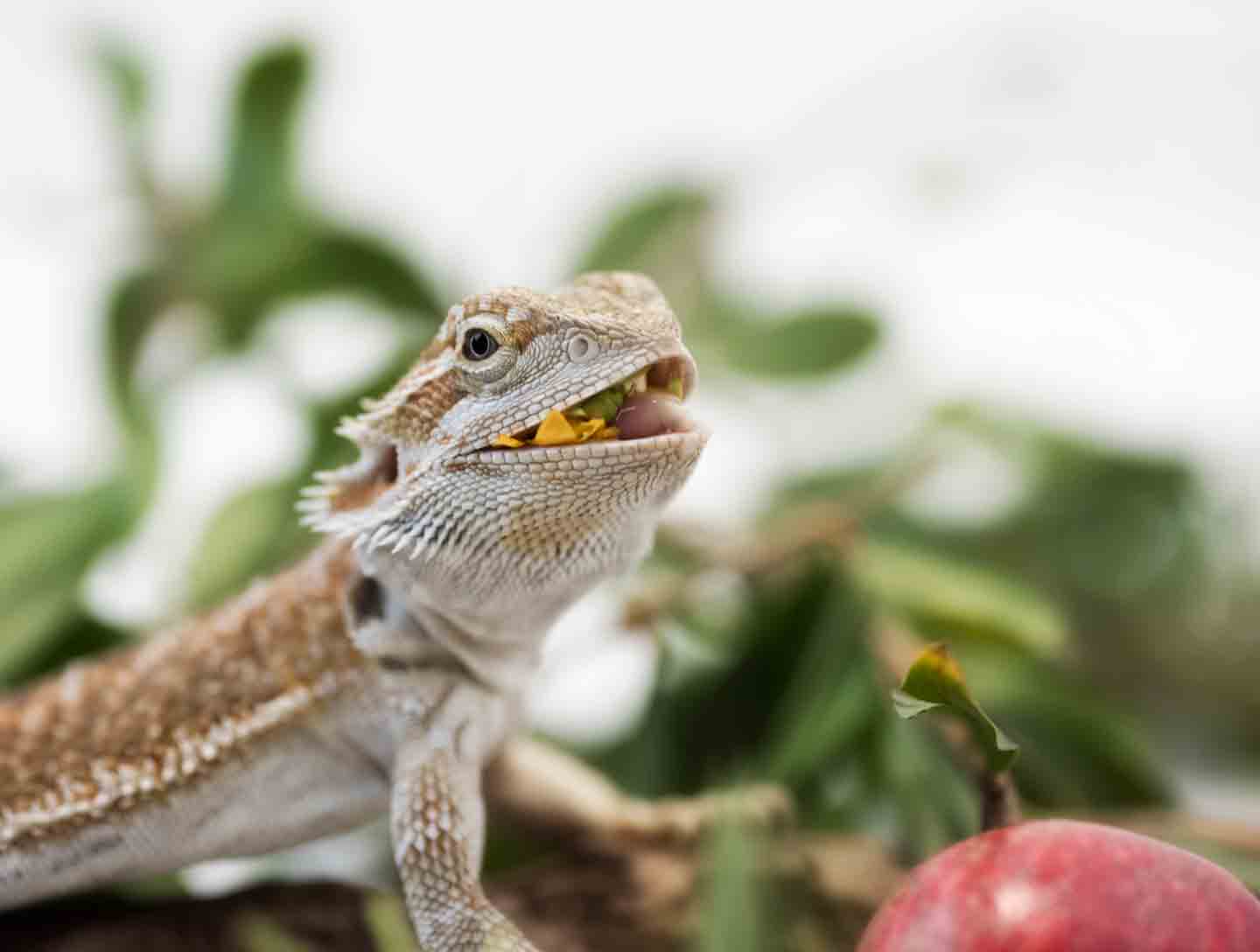
Here are a few helpful tips to make sure your bearded dragon is eating well.
- Consider the insect size: Only offer insects that are the correct size for your beardie. “A great way to determine this is to never offer insects that are larger than the distance between the bearded dragon’s eyes or the width of their head,” says Dr. Varble. Larger insects can cause choking, blockages, or constipation.
- Chop all veggies and fruit: For the same reasons, make sure fresh produce is chopped into small sizes so your bearded dragon can swallow the small bits whole. “Bearded dragons’ teeth are made for cutting but not grinding plant material,” Dr. Varble notes. “Smaller vegetables tend to be more appealing and acceptable to bearded dragons.”
- Don’t overfeed: Bearded dragons are hearty and voracious eaters. While that makes them a great pet lizard, it also makes them prone to obesity. “Although we want them to be well-fed, obesity can lead to liver disease and joint problems and should be avoided,” says Dr. Varble. Your vet can help you assess their weight.
- Feed under supervision: During or shortly after feeding, check to ensure your bearded dragon has eaten their live prey. This ensures no live prey is left to crawl around their enclosure and allows you to monitor their eating habits for any signs of health issues.
- Minimize hand-feeding: Hand-feeding bearded dragons can be beneficial for building trust and bonding, but it should be done only occasionally. This helps prevent them from becoming overly dependent on it and encourages natural foraging behaviors. Rather than hand-feeding, place their meal in and around their cage.
How Often Should I Feed My Bearded Dragon?
Feeding frequency depends on your pet beardie’s age:
- Hatchlings and juvenile bearded dragons (up to 12 months old) should be fed insects two to three times per day, offering as many insects as they can eat within 10 to 15 minutes, and a daily variety of finely chopped vegetables and leafy greens.
- Young adults (between 12 and 18 months) should be given insects once a day, with the frequency gradually reduced as they approach adulthood, while still receiving daily vegetables.
- Adult beardies (over 18 months) should be fed insects two to three times per week, in controlled amounts, and vegetable salads daily.
Adjust the feeding schedule based on your bearded dragon’s individual needs and health to ensure a balanced and nutritious diet. When in doubt, consult a veterinarian specializing in reptile care.
Do Bearded Dragons Drink Water?
Bearded dragons get a lot of their hydration from the moisture content in their food. However, it’s still important to provide your beardie with fresh water in a shallow water bowl in their enclosure at all times. Some bearded dragons will drink from this dish, especially when they need extra hydration or during shedding periods. Change the water every day to keep it fresh, clean, and appealing.
What Not To Feed Your Bearded Dragon
Good bearded dragon care also means avoiding certain foods. Here’s what not to feed bearded dragons and why:
- Wild insects: They may carry parasites, pesticides, or diseases that can harm your pet.
- Insects with a hard exoskeleton (like beetles): These can be difficult to digest and may cause impaction.
- Fireflies: They are toxic and can be fatal if ingested.
- Avocado: Contains persin, which is toxic to bearded dragons and can cause serious health issues.
- Citrus fruits: High acidity can cause stomach upset and other digestive issues.
- Iceberg lettuce: Lacks nutritional value and can cause diarrhea due to its high water content.
- Spinach: Contains oxalates that can bind with calcium, preventing its absorption and leading to metabolic bone disease.
- Alfalfa: While sometimes used in commercial diets, fresh alfalfa can be difficult to digest and may contain high levels of protein and fiber that are not suitable for regular feeding.
- Rhubarb: Contains oxalates and is toxic to bearded dragons.
- Non-fresh produce: Can harbor mold or bacteria that may cause illness.
- High-fat foods: Can lead to obesity and other health issues.
- High-sugar foods: Can cause obesity and other metabolic problems, as well as dental issues.
FAQs About What Bearded Dragons Eat
Q:What are beardies’ favorite food?
A:Bearded dragons love chomping on live insects such as crickets and Dubia roaches, along with a variety of leafy greens and vegetables such as collard greens and bell peppers. Occasional treats of fruits such as berries and mango can also be favorites, providing both nutritional value and variety.
Q:How often do you feed a bearded dragon?
A:How often you feed a bearded dragon depends on their life stage. Young beardies eat more often; aim for insects two to three times per day and a daily variety of finely chopped vegetables and leafy greens. Adult beardies over 18 months eat less frequently; ideally they should be fed insects two to three times per week in controlled amounts and vegetable salads every other day.
Q:Can bearded dragons eat mice?
A:No, as omnivores, beardies get their “animal” protein from live insects and not rodents such as mice. Feeding them mammals like mice is not appropriate for their digestive system and can be harmful to their health. Stick to a diet of insects, leafy greens, vegetables, and occasional fruits to ensure their nutritional needs are met safely.
Q:Can I feed my bearded dragon dry food?
A:Fresh is best when it comes to a bearded dragon’s diet. This reptile requires a diet of fresh vegetables, leafy greens, and live insects to meet their nutritional needs adequately. Dry food, such as pellets or commercial mixes, often lacks the variety and moisture content necessary for their health.
Raising a bearded dragon is exciting and entertaining! Make sure your pet gets their dietary needs met by following the above advice, and read up on our lizard guide that covers details like ideal habitat and handling.
Expert input provided by Dana Varble, DVM, CAE, the chief veterinary officer for the North American Veterinary Community (NAVC), based in Fox Lake, Illinois; and Micah Woods, DVM, an exotic pets veterinarian at Ooltewah Veterinary Hospital in Chattanooga, Tennessee.
This content was medically reviewed by Chewy vets.
More About Lizards
Share:
